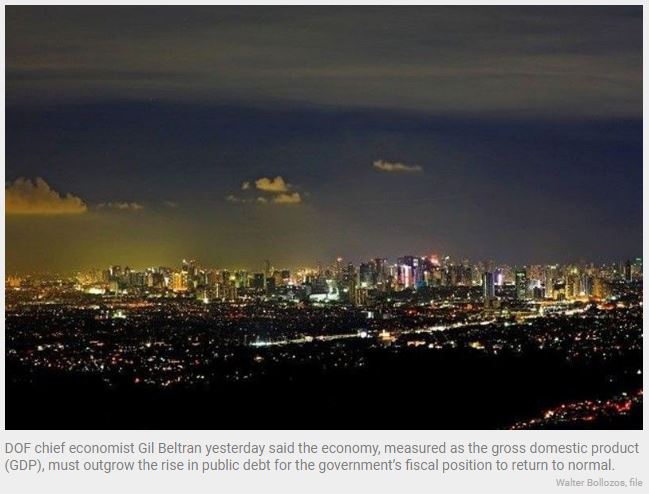Philippines: Economy needs to grow by 7% annually to manage debt – DOF
MANILA, Philippines — The next administration should make sure that the economy expands by at least seven percent every year until 2025 to bring down the debt ratio to within manageable levels, according to the Department of Finance.
DOF chief economist Gil Beltran yesterday said the economy, measured as the gross domestic product (GDP), must outgrow the rise in public debt for the government’s fiscal position to return to normal.
“From economic management in general, trimming down the debt to GDP ratio means growing the economy at a faster rate than the build-up of debt,” Beltran said.
The Cabinet-level Development Budget Coordination Committee targets to expand the GDP by seven to eight percent in 2022, and by six percent to seven percent from 2023 to 2025. Last year the economy grew by 5.7 percent on the resumption of business activities, rebounding from the record decline of 9.6 percent suffered in 2020.
Beltran said the next administration has the tools needed to sustain economic recovery from the pandemic. First, he asked that infrastructure expenditures remain a priority item in the budget to build on the gains made by the Duterte administration on public works.
Infrastructure spending reached a total of P1.12 trillion or 5.8 percent of the GDP in 2021, and is estimated to hover above five percent of GDP until 2025.
Beltran also proposed that the government maximize the tax cut under the Corporate Recovery and Tax Incentives for Enterprises (CREATE) Act in attracting investments.
The CREATE Act cut the CIT rate to 25 from 30 percent—the highest among Southeast Asian nations—but capped the period that investors can enjoy the incentive at 17 years.
Lastly, Beltran said the next administration should take advantage of the structural reforms put in place by the Duterte administration. In particular, he pointed to amendments made in the Retail Trade Liberalization Act (RTLA), Foreign Investments Act (FIA) and Public Service Act (PSA).
The new RTLA slashed the required capital for foreign retailers to P25 million from $2.5 million–or at least P125 million–while the amended FIA delisted the practice of professions from the negative list. On the other hand, the updated PSA restricted the scope of public utilities, opening up industries like telecommunications to foreign ownership.
Based on records, the outstanding debt of the Philippines has risen by 16 percent to an all-time high of P12.76 trillion, as of April, from P10.99 trillion a year ago due to pandemic borrowings.
As a consequence, the debt to GDP ratio has ballooned to a 17-year high of 63.5 percent as of the first quarter, exceeding the international standard of 60 percent observed by credit monitors and multilateral lenders.
Source: https://www.philstar.com/business/2022/06/24/2190433/economy-needs-grow-7-annually-manage-debt-dof


 English
English




